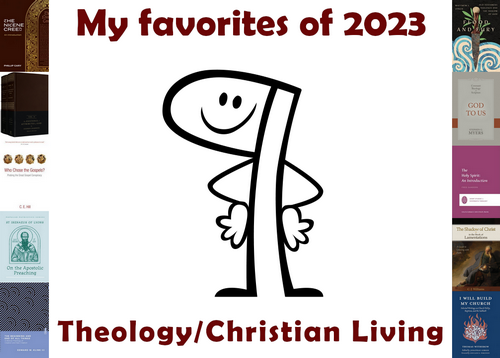
It probably says something about me that 40% of this list was written pre-20th Century (I have some friends who’d opine that it says I read too many contemporary authors). My reading plans for 2024 (as sketchy as they are at the moment), suggest I could be looking at a similar number next year. I actually hope so—this was good for me.
As always, re-reads don’t count for these lists.
(in alphabetical order by author)
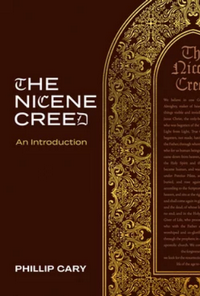 The Nicene Creed: An Introduction
The Nicene Creed: An Introduction
by Phillip Cary
My original post
This is a fantastic introduction to the Nicene Creed and/or some of the doctrines taught by it (technically, the Nicene-Constantinopolitan Creed, but who calls it that outside of technical discussions?). In many cases, it’ll be a review of ideas—but even in those cases, Cary will likely shed a different light on it, or make you think about the idea in a way you’re not used to. This can be a quick and breezy read, but it’s a mistake to let Cary’s simple and straightforward text let you read quickly—because there’s a lot to think about and reflect on here. Even if—especially if, actually—you recite the Creed on a regular or frequent basis every Lord’s Day. This is a great way to stop and meditate on these essential truths of the Christian faith.

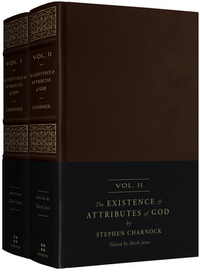 The Existence and Attributes of God: Updated and Unabridged
The Existence and Attributes of God: Updated and Unabridged
by Stephen Charnock, edited by Mark Jones
An original post (another is forthcoming)
This isn’t a definitive, exhaustive work on God’s attributes (or existence)—it cannot be (and would be blasphemous to suggest otherwise). But when you’re in the middle of a chapter, it’d be easy to think it is. Not just because of the depth Charnock goes into on each topic, but the angles he approaches it from. In the middle of the Discourse on God’s Knowledge, I was astounded, for example, by how many different ways he found to talk about it. It’s easy to see why this work has stood the test of time and can’t imagine anything in the 21st Century topping it (maybe someone will get their act together in the 22nd).

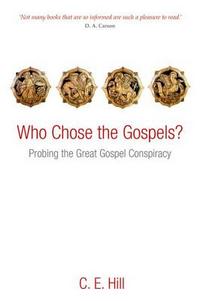 Who Chose the Gospels?: Probing the Great Gospel Conspiracy
Who Chose the Gospels?: Probing the Great Gospel Conspiracy
by C. E. Hill
My original post
An alternate title for the book could be, how do you solve a problem like Iraneaus? Or, more to the point, how do you ignore his (early date) recognition of only 4 gospels—Matthew, Mark, Luke, and John—despite what we’re told about the state of gospel availability and canonization by so many today. Hill examines some of the time frames, uses, content, and provenance of some of the so-called competitor gospels (i.e., those that never were considered canonical) to compare them to both the canonical gospels and those early figures of the Church we see discussing the gospels. But primarily, Hill is concerned with the use of and testimony regarding the canonical gospels—and the evidence regarding their use by the Church and when it started. What’s more, he discusses (and educates) these ideas while being entertaining (never sacrificing educating for entertaining). Hill is careful and thorough, acknowledging challenges to his position about the emergence of the fourfold Gospel to the place it holds today. But he’s consistent in showing how those challenges don’t have the weight and merit that so many in our culture assume they do.

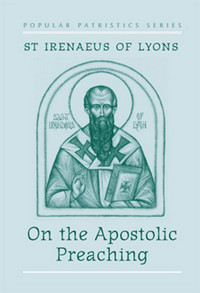 On the Apostolic Preaching
On the Apostolic Preaching
by Irenaeus of Lyons , John Behr (Translator)
My original post
This is exactly what I want to see out of a 2nd Century writer—because it’s the kind of thing I appreciate in a 21st Century Writer. It’s reassuring to see that the central idea of what Apostolic Preaching ought to be is pretty much the same for both eras—yeah, some of what Irenaeus wrote could use some fine-tuning (and he’d likely say the same of what shows up in one of the Essential Studies in Biblical Theology volumes I’ve discussed). But their modus operandi are so similar, that it’s clear that they’re walking in the same direction. This is a a quick, approachable read—as relatable today as it had to have been centuries ago (although I guess it’d be safe to say that many of his readers might not be ready to hear what he said in the same way I was). I was very encouraged by this and wish I’d read it years ago so I could be on my fifth or sixth reading now.

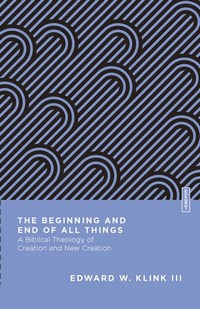 The Beginning and End of All Things: A Biblical Theology of Creation and New Creation
The Beginning and End of All Things: A Biblical Theology of Creation and New Creation
My original post
Klink starts by saying that a doctrine of creation needs to be about more than what happened in Genesis 1-2, piquing my interest and getting me on his side immediately. His point is that the doctrine needs to concern itself with why God made the Earth—what was His purpose in creating, what’s His goal for the creation, and so on. It’s about the goodness of the creation and how we are to enjoy and preserve it. It’s ultimately about the new creation, what is going to happen on that Last Day when creation is renewed, restored, and recreated. This is a refreshing, warm, and pastoral look at a doctrine we too often limit to a narrow question, missing the big picture.

 Flood and Fury: Old Testament Violence and the Shalom of God
Flood and Fury: Old Testament Violence and the Shalom of God
I read this book back in March, and have yet to write a post about it because I’m still wrestling with some of Lynch’s positions and arguments. The biggest area that I was working through and on was his treatment of the relation of the Flood to the Covenant in the Garden and the Noahaic covenant to that covenant as well. The next book on this list helped me tremendously (mostly to Lynch’s detriment). But that’s not to say that I didn’t get anything from that portion of the book, it just made me think a lot—so much that I couldn’t write anything about the book as a whole. The portions of the book on Divine Violence in general (how to think of it, how not to think of it or avoid the idea, either) and about the conquest of Canaan are strong and very helpful.

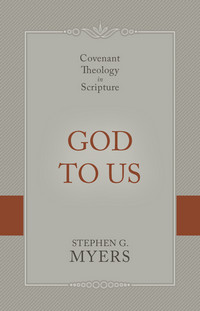 God to Us: Covenant Theology in Scripture
God to Us: Covenant Theology in Scripture
My original post
I’ve read more books on Covenant Theology than I can easily count, and if this isn’t the best, it’s so close to it as not to matter. Myers gives his readers a thorough introduction to Covenant Theology as it came to the Protestant Church from the Reformation—particularly the English Reformation and the explanation offered by the Westminster divines and their contemporaries. His introduction is readable, clear, and helpful to the layman willing to put in a little work—but he’s not just repeating what the previous generations gave us, he’s looking at contemporary theology and insights as well.
That our Lord would condescend to His people in covenant is mind-blowingly gracious in the first place—that He does so to rebels in order that he could win them to Himself? That should drive us to worship. And the more we understand the gracious and remarkable nature of these covenants, the more we should be driven to it. Myers brings his readers to this point repeatedly—sometimes just by explaining something clearly—sometimes by applying his explanation to the reader to help us understand how it should make us reflect in worship.

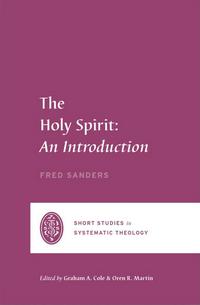 The Holy Spirit: An Introduction
The Holy Spirit: An Introduction
by Fred Sanders
My original post
A very capable, useful, and timely introduction to Pneumatology. Sanders doesn’t allow himself to get drawn into the flashy and controversial aspects of the doctrine of the Spirit (not that he shies away, either)—he sticks to the basics and essentials (and a good understanding of those will eliminate the need to discuss some of the controversial areas). Sanders’s tone is certainly engaging—he never loses sight of the importance of what he’s talking about, and the necessary reverence. But he’s okay with being chatty and a little witty with the reader. He’s able to break down some complicated and technical points in a way that the reader can find them understandable and compelling. It’s just so helpful, and so good, that I can’t help but recommend this one.

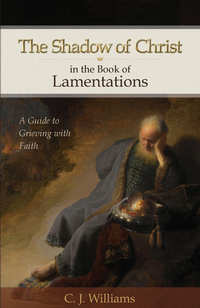 The Shadow of Christ in the Book of Lamentations: A Guide to Grieving with Faith
The Shadow of Christ in the Book of Lamentations: A Guide to Grieving with Faith
My original post
I didn’t expect this to come up as an option for this year’s list, I thought I read this a year or two ago, not 11 months ago. But I was glad to look over my notes and post about it again for this post. This is a very accessible and thorough—without trying to be exhausting—look at the book of Lamentations and how it reveals Christ to the reader for his assurance and comfort in trial.

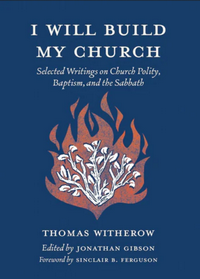 I Will Build My Church: Selected Writings on Church Polity, Baptism, and the Sabbath
I Will Build My Church: Selected Writings on Church Polity, Baptism, and the Sabbath
by Thomas Witherow, Edited by Jonathan Gibson
My original post
Yes, this is kind of a cheat—because I have read one of the three works (plus a lengthy biographical essay) in this collection. But it’s a self-imposed rule, so I’m not going to be that precious about it (this once). Also, reading it in the midst of all this other material gave The Apostolic Church: Which Is It? a different vibe (for lack of a better term). It’s not just a defense of Presbyterian Church Polity, but it’s part of an apologetic for Presbyterian Distinctives as a whole.
And that’s what Winslow’s mission was—to present Presbyterianism as not just another flavor for Irish Protestants to pick, but one that has a message, a conviction about their distinctives, and Biblical reasoning—not just whim or tradition—behind them. Sure, some of it will feel dated to contemporary readers. And it should—but that doesn’t make any of it bad. Nor does it disprove any of Winslow’s arguments (in fact, some of our contemporary situations would lead the reader to say, “he was right, if we do X, Y will follow.”)

![]()




